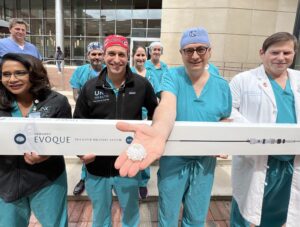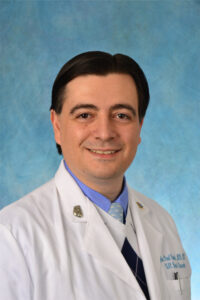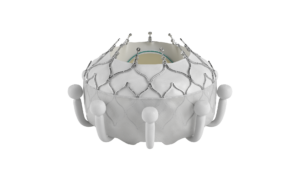John P. Vavalle, MD, MHS, FACC, and Matthew A. Cavender, MD, MPH, FACC, interventional cardiologists and their collaborative team in the Structural Heart Disease Program at UNC, have performed their first transcatheter tricuspid valve replacement in the clinical setting, a revolutionary treatment for patients living with a common type of heart valve disease.

CHAPEL HILL, N.C. – For the first time in the state of North Carolina, the structural heart team at UNC Hospitals has performed a transcatheter tricuspid valve replacement in the clinical setting. The implant is a revolutionary treatment for patients living with tricuspid valve regurgitation (TR), a common type of heart valve disease.
“We now have a percutaneous, minimally invasive way to fix tricuspid valve regurgitation and offer valve replacement without the need for open heart surgery,” said John Vavalle, MD, MHS, FACC, medical director of the Structural Heart Disease Program at UNC Hospitals and associate professor of medicine at the UNC School of Medicine. “It’s only at a place like UNC, where there is this spirit of collaboration and this desire to push the technology forward, that you can do this kind of work.”

About 5 in 1,000 people in the United States have severe tricuspid valve regurgitation. The condition occurs when the tricuspid valve, the valve that separates the right atrium and the right ventricle of the heart, does not close properly. As a result, blood cannot be ejected to the lungs to be oxygenated and instead flows back into the body.
Without treatment, the condition can become life threatening. It can cause fluid buildup in the abdomen and legs and weakening of the heart muscle, resulting in fatigue, low energy, breathlessness, and even kidney failure. Medicines like diuretics can help improve swelling from the fluid buildup, but fixing a leaky valve previously required open heart surgery.
“Many of these patients are too sick to have major open-heart surgery, including our very first patient,” said Vavalle. “This procedure is much more minimally invasive. It’s done through catheters and over wires inserted through the blood vessels in the groin, allowing us to implant a new tricuspid valve in place of the old one.”

The EVOQUE tricuspid valve replacement system, created by the Edwards Lifesciences Corporation, is the first transcatheter therapy to receive U.S. Food and Drug Administration (FDA) approval for the treatment of tricuspid regurgitation.
The EVOQUE system is indicated for the improvement of health status in patients with symptomatic severe TR despite optimal medical therapy, for whom tricuspid valve replacement is deemed appropriate by a heart team.
The UNC Heart Valve Clinic, which is an American College of Cardiology certified Transcatheter Valve Center of Excellence, was one of 20 centers in the United States selected for implanting the valve because of UNC’s high level of expertise. It is the only center in the state of North Carolina currently performing this procedure.
The same team, led by Vavalle and Thomas Caranasos, MD, as co-principal investigators participated in the TRISCEND II clinical trial that determined the safety and effectiveness of the EVOQUE valve, eventually leading to FDA approval.
The surgery requires a diverse team of cardiologists, cardiac surgeons, cardiac anesthesiologists, and advanced imagers. John Vavalle worked with fellow interventional cardiologist Matthew Cavender, MD, MPH, chief of cardiac surgery John Ikonomidis, MD, PhD, anesthesiologist Emily Teeter, MD, FASE, and imaging specialist Thelsa Thomas Weickert, MD, on the case.
Media contact: Kendall Daniels, Communications Specialist, UNC Health | UNC School of Medicine